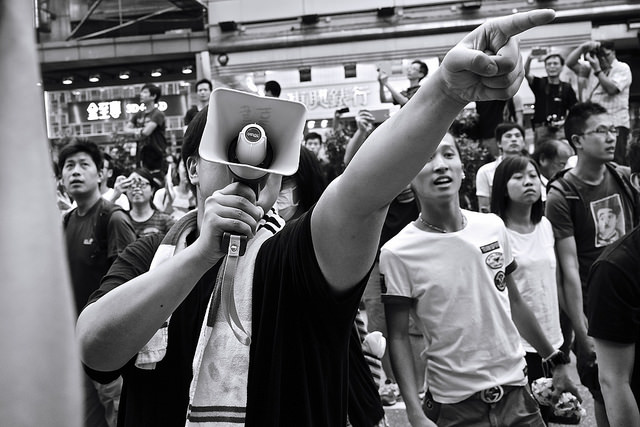Harnessing the politics of disruption
Posted By Mark Leonard on February 2, 2017 @ 06:00

The United Kingdom’s vote to exit the European Union and Donald Trump’s election as US president exposed a deep generational divide. Cosmopolitan millennials and nationalist pensioners—what Thomas Friedman calls [1] ‘Web People’ and ‘Wall People’—seem to have nothing in common. But both point to the same crisis of political representation.
In the UK, for every ‘Leave’ voter under the age of 24, there were three over the age of 65. In the US, Trump won 53% of the over-65 vote, but was supported by only 37% of 18-29-year-olds.
In both cases, the elderly were attracted by pessimistic rhetoric assailing the damage to their communities brought about by free trade, free movement, free love, and human-free technology disrupting their jobs and economic security. Young people were far more optimistic about the future, their personal prospects, and technology’s potential—and far more empathetic toward marginalised groups.
The pessimists won, and now they’re feeling pretty hopeful. The former optimists now fear the worst.
But, despite their fundamentally different attitudes toward technology and globalisation, the Web People and the Wall People have one thing in common: both are deeply skeptical of existing institutions. They think that representative democracy has broken down, and they see the creative potential of disruption.
The Wall People want to smash the existing system, in the hope that something better emerges—something that looks a bit more like the familiar world of times past (or at least of their fancy). The Web People, for their part, believe that technology must transform politics and institutions, just as it has transformed newspapers, taxi services, and hotels.
The web mentality is exemplified by Vyacheslav Polonski, a 27-year-old network scientist of Ukrainian origin, who has spent time at Harvard and is currently completing a PhD in social media at Oxford University. ‘We are dealing with a twenty-first-century world,’ he tells me, ‘but our political system has not evolved since the eighteenth and nineteenth centuries.’
Polonski points out that our government institutions were established not just before Facebook and Instagram, but even before television and radio. Whereas our economy is now characterised by choice, customisation, and participation, our politics remains stifled by bureaucracy, special interests, and entrenched-yet-declining political parties. ‘As our government becomes more agile,’ he says, ‘people can vote for specific ideas and agendas, rather than a political party.’ As a result, ‘politics will become more like Uber: more decentralised, more open, more immediate.’
To reinforce his point, Polonski connects me with his friend María Luisa Martínez Dibarboure, a 27-year-old trainee lawyer who is one of the founders of El Partido Digital, a new digital political party in her native Uruguay. ‘We live in a crisis of representation,’ Dibarboure tells me on Skype (how else?). ‘Once people are in power,’ she laments, ‘they vote according to their own preferences,’ not those of the voters who put them there.
Dibarboure’s solution is to use the Internet to ensure accurate representation. El Partido Digital is currently working to elect a representative to parliament. That representative would use the Internet to poll her constituents before each parliamentary vote, thereby ensuring that she really is a voice for voters.
More intriguing, constituents will be able to delegate their votes to others, perhaps friends with more expertise on particular issues. Fred the economist could vote on my behalf on economic questions, and Anne the scientist could vote for me on environmental matters.
Dibarboure’s concept relies on neither elections nor referenda. Instead of representative or direct democracy, it offers what she and Polonski call ‘liquid democracy’—a system that combines the best of both. ‘We are about representation, not ideology,’ she clarifies. ‘We don’t represent left or right.… This is about the people.’
Polonski and Dibarboure are members of a community of 6,000 ‘global shapers [2],’ brought together by the World Economic Forum. These 23-27-year-olds are creative, connected, cosmopolitan, and full of energy. They are crestfallen about recent election results (‘2016 was the year in which I lost faith in humanity,’ says Dibarboure). But my sense is that they will bounce back soon, and find opportunities in today’s political disruptions.
This is not to say that these disruptions are the answer to their problems, or even to the problems of the Wall People. On the contrary, today’s political disruptions could make some of the outcomes that these groups favor more difficult to achieve.
The old and young alike hope to recapture the opportunities enjoyed by the post-1945 Baby Boom generation. But those opportunities were enabled by a commitment to collective action, broad support for redistribution, and strong economic growth—none of which can be counted on today. On the contrary, the backlash against globalisation and immigration will likely damage global growth, while the need to build ad hoc coalitions of the willing undermines progress in building new institutions. For many nowadays, redistribution has become a dirty word.
So the politics supported by the Wall People isn’t the answer. But nor is the politics of the Web People. While disruptive, Internet-enabled politics can upend the status quo—the Arab Spring revolutions taught us that—it has not proved particularly effective at creating sustainable alternatives.
The grievances of the old and the young are very real. The economic gains of the last few decades have not been shared widely enough. Political parties are more beholden to themselves than they are to the communities they serve. There is socialism for the rich, and capitalism for the poor. The war on terror is creating more terrorists. And trade and migration systems are losing support.
Rather than defend the status quo from the counter-revolution, the political class should work to create a new system—one that responds to the needs of the people. Both the young and the old have made their demands known. It is time to respond.
Article printed from The Strategist: https://www.aspistrategist.org.au
URL to article: https://www.aspistrategist.org.au/harnessing-politics-disruption/
URLs in this post:
[1] calls: https://www.nytimes.com/2016/07/27/opinion/web-people-vs-wall-people.html?_r=2
[2] global shapers: https://www.weforum.org/communities/global-shapers
Click here to print.